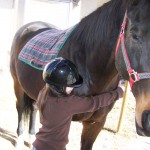 A few weeks ago I attended a very powerful seminar, presented by Heather T. Forbes, LCSW, on ‘Trauma Informed Practices’. This particular seminar was geared to educators, but the ideas presented are designed to be used across environments.
A few weeks ago I attended a very powerful seminar, presented by Heather T. Forbes, LCSW, on ‘Trauma Informed Practices’. This particular seminar was geared to educators, but the ideas presented are designed to be used across environments.
The basic principles are that someone who has been raised/lived through trauma is somewhat like a puzzle with pieces missing. Because of the trauma, the person has not learned (or had changed) certain ways to react to life’s challenging/stressful situations, causing emotional ‘dysregulation’. Therefore, we as parents, caregivers, educators and therapy providers must find different ways to help these kids/teens/adults deal with challenges and heal as much as possible from the traumatic experiences. There is more information and resources available on the BEYOND CONSEQUENCES INSTITUTE website.
certain ways to react to life’s challenging/stressful situations, causing emotional ‘dysregulation’. Therefore, we as parents, caregivers, educators and therapy providers must find different ways to help these kids/teens/adults deal with challenges and heal as much as possible from the traumatic experiences. There is more information and resources available on the BEYOND CONSEQUENCES INSTITUTE website.
Today I want to share with you Heather’s ‘Parenting Daily Reflection’:
|
When ‘in the moment’ with your child, your child is in his right brain. He is emotional and he is unable to access his cognitive and rational thinking (i.e., his left brain.) Asking him to tell you ‘why’ he is acting in this way is non-productive. Asking him to make a ‘choice’ is impossible. And asking him to ‘stop’ is against nature. Allow yourself to join your child in his dysregulated emotional place. Let the rational thought and the life lesson follow later when he is calm and more receptive. Join him in love and allow him the space to be all he knows how to be for that very moment. |
 Work with horses can be a powerful intervention for people living with dysregulation. They can learn and practice a variety of self-soothing/calming skills that may be very helpful for them in other challenging situations. Additionally, we work with parents/caregivers/partners, providing them information and tools to help them interact effectively with
Work with horses can be a powerful intervention for people living with dysregulation. They can learn and practice a variety of self-soothing/calming skills that may be very helpful for them in other challenging situations. Additionally, we work with parents/caregivers/partners, providing them information and tools to help them interact effectively with  their child/teen/adult struggling with past traumatic issues.
their child/teen/adult struggling with past traumatic issues.
We are for you. If you would like to learn more about how equine assisted therapy and how it may help, call or email. We will schedule a visit to the ranch, introduce the horses, learn more about what you are dealing with and share how we may be able to help.
